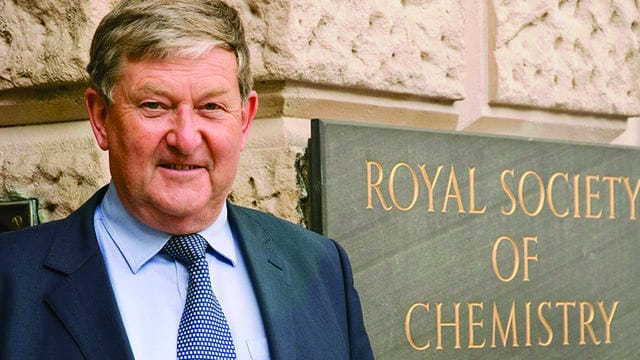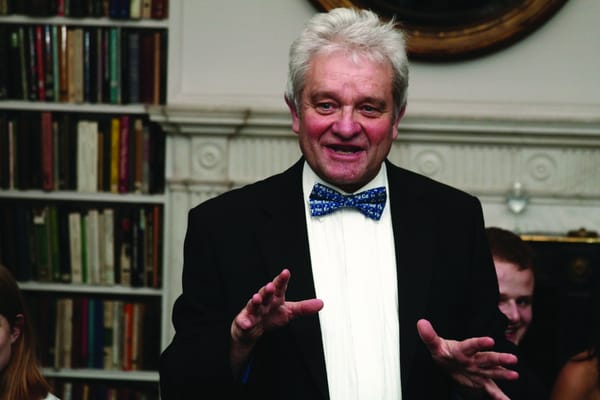A brave new molecular world
The president of the RSC takes to the floor for the Friends of Imperial College

Professor David Phillips, current president of the Royal Society of Chemistry, took to the lectern on November 8 for the latest Friends of Imperial College (FOIC) event.
In line with FOIC’s celebrations of the UN Year of Chemistry, the Imperial professor emeritus guided the audience with an authoritative yet avuncular manner through a few of his personal predictions for the future of chemistry.
A great deal of the work done by the RSC centres on highlighting the key challenges faced by the world today for which chemistry hopes to hold solutions. Foremost amongst these is the development of green chemistry, especially ionic liquids as a substitute for more harmful solvents. Solvents are critical in most industrial chemical processes, as illustrated by the fact that they represent 90% of the waste products in the pharmaceuticals industry.
Regrettably however these same solvents make up 35% of global emissions of volatile organic compounds (VOCs) that give rise to smog and greenhouse gases.
There were a few bewildered faces amongst the group of visiting secondary school students as Phillips cited the case of Viagra production as an example of the improved consumption habits and efficient use of solvents. Having required 1300 litres of ‘red’, harmful solvents to produce a kilogram of Viagra in 1990, today we need only 6.3 litres of less dangerous ‘amber’ solvents, with the hope being that we might need an even smaller amount of the ideal ‘green’ solvents in the near future.
support for the sciences in the UK would sow the seeds of future prosperity
An explanation of Viagra’s applications and an anecdote involving Prince Phillip later, the look of confusion on the faces of school students quickly changed to one of horror, probably as a result of mental images that the wizened prince and a sex-drug together might evoke.
Whilst some of the more virile among us might question whether the efficient production of Viagra represents a key global challenge, the importance of securing a safe, environmentally friendly food supply is undoubtable.
Phillips shared the case of azoxystrobin, a seemingly paradoxical fungicidal fungus discovered through blue-sky research by Czech and German chemists. Having found that trees with the fungus strobilurin (the active agent in azoxystrobin) grew no other fungi, research was undertaken that led to a frantic patent battle between Sygenta and BASF. The former won, handing in their application 24 hours before the latter, and Sygenta announced annual azoxystrobin sales of over $1bn in 2008. Used as a fungicide in wheat, vegetables and a wide range of commonplace foodstuffs, Phillips hypothesised that without the chemical (and the grasp of chemistry to harness its properties) we would see food prices increase by half overnight.
Shifting from the kitchen table to the operating table, Prof. Phillips’ most impressive examples of frontier chemistry came in medical applications. Photodynamic therapy (PDT) enables the treatment of malignant tumours through photosensitive agents that attach exclusively to the tumour tissue and bombard it with singlet oxygen. Talking through the case of a patient with a tongue tumour, Prof. Phillips pointed out that two decades ago, treatment would have certainly resulted in removal of the tongue, rendering the patient speechless for life.
With PDT, a technique developed from research in bio fluorescence, a patient can expect to see the tumour in remission within a week of treatment and be fully healed in a matter of months. If things couldn’t get any better, the procedure is minimally invasive and tumours hold no possibility of developing a resistance.
Naturally accustomed to political persuasion through his role at the RSC, Phillips took every opportunity to impress upon his audience the merits of blue-sky research – how whilst today it may seem aimless, it will no doubt form the springboard for the great leaps of tomorrow. Given the current economic climate, he proposed that support for the sciences in the UK would sow the seeds of future prosperity, highlighting that even today apparently trivial discoveries made two decades ago are finding life-enriching and economically beneficial applications. Are you reading, Mr. Cameron?






